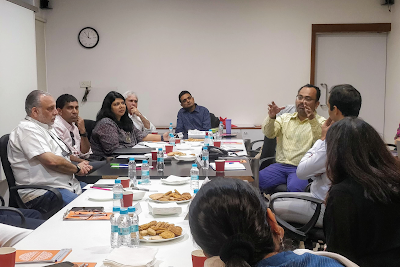Play for Transformation: Toybank Round Table Discussion Part II
Read Play for Transformation: Part I.
While the panelists identified why Play is undervalued in India, they also discussed the need for a systemic change to make it mainstream.
While the panelists identified why Play is undervalued in India, they also discussed the need for a systemic change to make it mainstream.
More government initiatives to promote Play
Apart from parents and teachers appreciating the
significance of Play in a child’s life, there’s a need for more government
initiatives to promote it. Play also needs to permeate into rural areas where
children are usually idle and easily manipulated into bad habits and social
evils. To catch the attention of a larger populace, there’s a requisite for a
driver or an evangelist. The message has to hit home to multiple stakeholders.
Mainstreaming Play would include how that is achieved. The larger the message,
the more successful the endeavor would be.
Link outcomes of Play to families and communities
Sumangali Gada averred that constituencies like toy
manufacturers, libraries or organizations working in the space of Play need to
pick a common message and tie it all together. Seema believes that Play must
not just be linked to outcomes in isolation but also be combined with the
positive impact on families and communities. She reasoned that with all the
research going on around mental health, Play, self-development and resilience
are hugely important to potentially prevent some of those issues.
Upholding Play to the same rank as Right to Education
Toybank Founder & CEO, Shweta Chari observed that Play
would become mainstream if it’s upheld to the same rank as the Right to
Education. Only when it’s deemed an absolute by everyone—irrespective of their
class and whether urban or rural—will play become as natural as breathing air.
Looking at it in the same reformed way as people treat education and health
these days, will go a long way in making it more customary.
Finally, the speakers recommended the following points to
bring about the needed change:
- Simple messaging about Play’s values since quantification is currently impractical
- A deliberate program around the merits of structured play
- Convincing the older generation that play is vital
- Connecting the benefits of play to something substantial, like employability
- Speaking the language that would resonate with the lesser-privileged—like, Play improves language skills to succeed in job interviews
- Providing data that proves tangible progress caused by play
- Standardized tests to evaluate parameters like learning ability, language, Maths.
- Making play a part of the curriculum and report card as India is exam-oriented
- Project-based schools that promote free play and other programs to support education




Comments